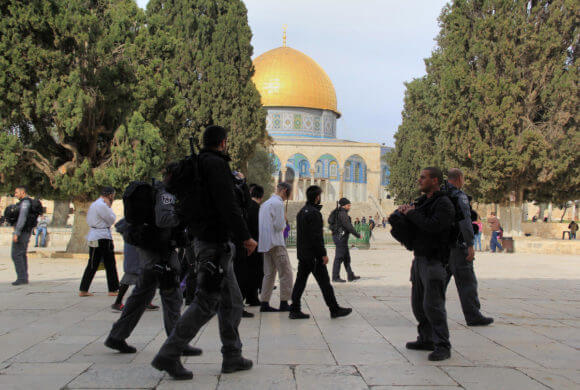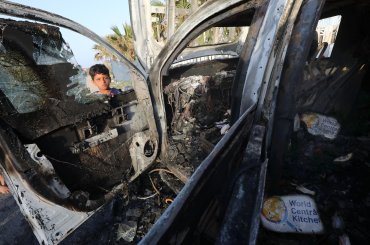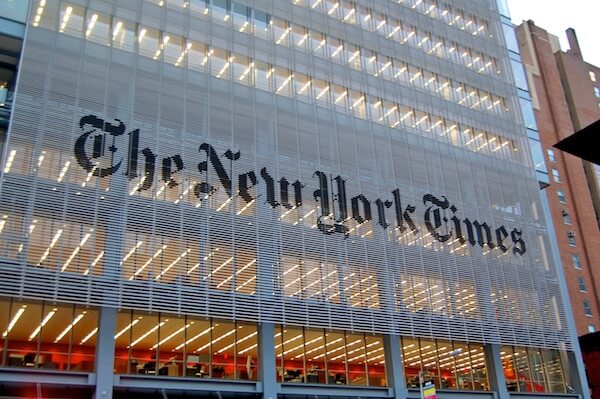Biased editors at the New York Times are sabotaging the reporting of their own man on the spot in Israel, Patrick Kingsley — and preventing readers from fully understanding why Jerusalem’s Old City has become a dangerous flash point.
Over the past few weeks, the Times, along with others in the mainstream U.S. media, has reported on “clashes” in and around the 1300-year-old Al-Aqsa mosque, which is one of the holiest sites in Islam. Those reports have been vague, sometimes implying that the violence was triggered by Palestinians who threw stones from inside the mosque, or also suggesting that the tensions are caused by ‘age-old religious differences.’ The accounts characteristically imply that it was the Palestinians who started the latest conflict; here’s the second paragraph of Kingsley’s latest report: “the skirmish. . . followed a deadly wave of Arab attacks in Israel and an ensuing Israeli military crackdown in the west Bank.”
Hold on. Let’s rewind to last August. Back then, Kingsley (along with Adam Rasgon) published a valuable article headlined: “In Shift, Israel Quietly Allows Jewish Prayer on Temple Mount.” The sub-headline added: “. . . the change upsets a longstanding compromise aimed at staving off conflict.” (Many Israeli Jews believe that the Al-Aqsa mosque was built in the same location where two ancient Jewish temples once stood, so they call the area the “Temple Mount.”)
The “longstanding compromise,” the article explained, was that non-Muslims were allowed “to visit the site for several hours each morning on the condition that they not pray there. Though no Israeli law explicitly bars Jewish prayer there, Jewish visitors who attempted to pray there have been removed or reprimanded by the [Israeli] police.”
Then, the policy changed. In July last year, the Times said, “suddenly Israeli news outlets published images and footage of dozens of Jews praying openly on the Mount. . .”
Tensions rose. Extremist Israeli Jews have long threatened to actually try and destroy the Al-Aqsa mosque, and rebuild a new Jewish temple there. This was the theme of a dramatic (and excellent) Israeli film, “Time of Favor” (2000).
This site’s Yumna Patel was on top of the story, explaining that thousands of Jewish Israeli settlers have been provocatively parading through the area.
The mainstream press downplayed this angle, and tried to blame the Palestinians instead. In Kingsley’s latest report, on April 22, you have to read all the way down to paragraph 18 to learn that:
For months, the Israeli police protected Jewish worshippers at the site, breaking a decades-old understanding, aimed at preventing conflict, that allowed Jews to visit but not worship there. That change has created the impression among Palestinians that Israel is trying to unilaterally change the delicate status quo, and further undermine Muslim access to and oversight of one of the most sacred places in Islam.
Patrick Kingsley knows better. He most likely put these key paragraphs much higher in his report — until the editors got hold of it.
Other mainstream U.S. reports have been no better. The Washington Post waited until paragraph 11 to make even a vague passing reference to the changed Israeli policy, and an on-air report at National Public Radio was even more unclear.
Why did the Israeli government change its policy last year, and add to tensions? You have to get to the very end of Kingsley’s most recent article to find out. He explains that prime minister Naftali Bennett “leads an immensely fragile coalition government” which includes religious rightists. Restoring the historic compromise could cause Bennett’s government to fall.
Leave it to the respected Israeli daily Haaretz to add some valuable context, by Hanin Majadli, a Palestinian citizen of Israel: “What Jewish Israelis don’t get about Al-Aqsa:” She writes:
“[Al-Aqsa] is no longer just an ordinary mosque and the connection to it is no longer religious. It serves as a symbol of Palestinian national victory over Jewish ultranationalism. This victory is achieved thanks to the fact that the area of Al-Aqsa is the only place that Israel refrains from controlling, and that situation is enshrined in law. . . The determination of the east Jerusalemites, and their battle against the clubs and grenades of the police forces, have become a symbol of effective resistance as well as conveying a clear message: ‘We won’t allow you to control Al-Aqsa, because it is the last piece remaining under Palestinian control, and no Palestinian will give it up.’



Glad to read the full Crimson editorial.
2 of 2
“Nothing about PSC’s Wall of Resistance denies that. While members of our campus might well find its messages provocative, or disagree with their philosophical outlook, nothing about them is, in our view, worthy of that delegitimizing label. We have a certain community-wide tendency to dismiss opposing views as inherently offensive and unworthy, straw-manning legitimate arguments and obfuscating difficult but necessary discussions. Yet civil discourse and debate, even when trying, are fundamental steps towards a better reality. Israel remains America’s favorite first amendment blind spot. Companies that choose to boycott the Jewish state, or otherwise support the pro-Palestine Boycott, Divest, and Sanction movement face legal repercussions in at least 26 states.
“Even for journalists, openly condemning the state’s policies poses an objective professional risk. Only last year, the Associated Press prompted outcry after firing a news editor over college-age tweets critical of Israel. The controversial decision followed a long-established pattern: Dare question Israel’s policies or endorse Palestinian freedom and you will be shunned from the newsroom, past accomplishments or legitimate arguments be damned. For college students like ourselves, speaking bluntly about events in the region can prompt online harassment or even land you on a blacklist.
“What this immense opposition to student activists and journalists makes clear is the overwhelming power imbalance that defines and constricts the ongoing debate. This stark power differential extends far beyond the arena of free speech, shifting from rhetorical to lethal on the ground in Palestine, where Israeli soldiers have killed nearly 50 Palestinians, including eight children, this year alone.”
1 of 2
In Support of Boycott, Divest, Sanction and a Free Palestine | Opinion | The Harvard Crimson (thecrimson.com)
By The Crimson Editorial Board, April 30/22
EXCERPT;
“When oppression strikes anywhere in the world, resistance movements reverberate globally. The desire for rightful justice spreads, like wildfire, moving us to act, to speak, to write, & right our past wrongs.
“Over the past year, the Harvard College Palestine Solidarity Committee has strived to do just that. Amid escalating tensions between Israel & Palestine, PSC has hosted informational programming, organized weekly demonstrations of support through ‘Keffiyeh Thursdays,’ & even installed a colorful, multi-panel ‘Wall of Resistance’ in favor of Palestinian freedom & sovereignty.
“In at least one regard, PSC’s spirited activism has proven successful: It has forced our campus — & our editorial board — to once again wrestle with what both Human Rights Watch & Amnesty International have called Israel’s ‘crimes against humanity’ in the region.
“We first & foremost wish to extend our sincere support to those who have been & continue to be subject to violence in occupied Palestine, as well as to any & all civilians affected by the region’s bellicosity. We are not sure how these words will reach you, or whether they’ll do so at all. But our stance isn’t rooted in proximity or convenience, but rather in foundational principles we must uphold — even if (or perhaps especially when) it proves difficult.
“This editorial board is broadly & proudly supportive of PSC’s mission & activism, including its recent art display. The admittedly controversial panels dare the viewer to contend with well-established, if rarely stated, facts. They direct our eyes towards the property & land confiscations, citizenship denials, movement restrictions, & unlawful killings that victimize Palestinians day in & day out. Art is a potent form of resistance, & we are humbled by our peers’ passion & skill.
“In the wake of accusations suggesting otherwise, we feel the need to assert that support for Palestinian liberation is not antisemitic. We unambiguously oppose & condemn antisemitism in every & all forms, including those times when it shows up on the fringes of otherwise worthwhile movements. Jewish people — like every people, including Palestinians — deserve nothing but life, peace, & security. (cont’d)